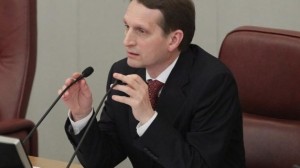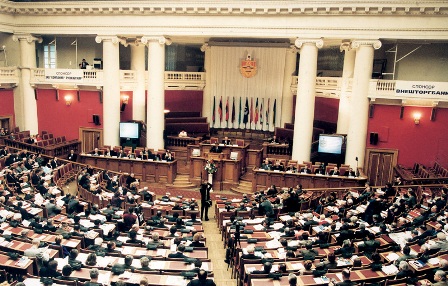Russian parliamentary speaker and former Historical Truth Commission Chairman Sergei Naryshkin has made statements asserting that it was Ukraine–not Russia–that actually annexed Crimea, citing a 1991 Crimean referendum as evidence. Naryshkin made his statements to the Russian parliament Wednesday.
RIA Novosti quotes Duma Speaker Sergei Naryshkin, “Back in January 1991, the Crimean region held a referendum, which disputed the transfer of Crimea to Ukraine. The vote for this was 93 percent with a turnout of 81 percent. Essentially, then, it was 23 years ago that the annexation of Crimea was made–though peaceful–but it was really annexation.”
Naryshkin said that the Ukrainian annexation of Crimea was possible because of the irresponsibility of some Russian politicians.
The 1991 referendum referred to by Naryshkin was over the issue of Crimea becoming an autonomous republic within the Soviet Union, and there was strong support in favor.
Ukrainian scholar Natalya Belitser wrote of this referendum, “After much heated debate and, perhaps, keeping in mind the possible bloody and violent consequences of rejecting demands similar to those made in other parts of the ailing Soviet Union, on February 12, 1991, the Ukrainian Supreme Soviet adopted a law providing autonomous status for Crimea within the borders of Ukraine.”
When, months later and after the failed coup against Mikhail Gorbachev and Ukraine’s declaration of independence, Crimea voted in a nation-wide ballot, 54 percent of Crimeans favored Ukrainian independence.
Following Naryshkin’s statement about Ukraine annexing Crimea, a history is given of the return to Russia of Crimea, which begins in November 2013 Maidan protests, and reaches a critical point on February 22 after “a violent seizure of power.” Following this, Verkhovna Rada, violating political agreements, changed the constitution and changed the leadership of the parliament and the Interior Ministry and removed power from the head of state, who was later forced to leave Ukraine, fearing for his life, according to the history.
“Crimea, in turn, did not recognize the legitimacy of the new government and decided to hold a referendum about the future of the region,” continues the article. “Voting took place on March 16. The ballot paper were made two questions: ‘Are you for the reunion of the Crimea with Russia on the Rights of the Russian Federation?’ and ‘Are you for the restoration of the Constitution of the Republic of Crimea in 1992 and for the status of the Crimea as part of Ukraine?'”
Sergei Naryshkin is a Russian official, politician and businessman who has been Chairman of the State Duma since December 2011. Previously he was head of the Administration of the President of Russia from May 2008 to December 2011; he was also chairman of the Historical Truth Commission in May 2009 until it was dissolved in February 2012.
By Day Blakely Donaldson
